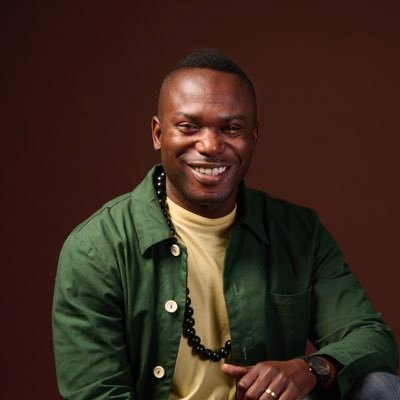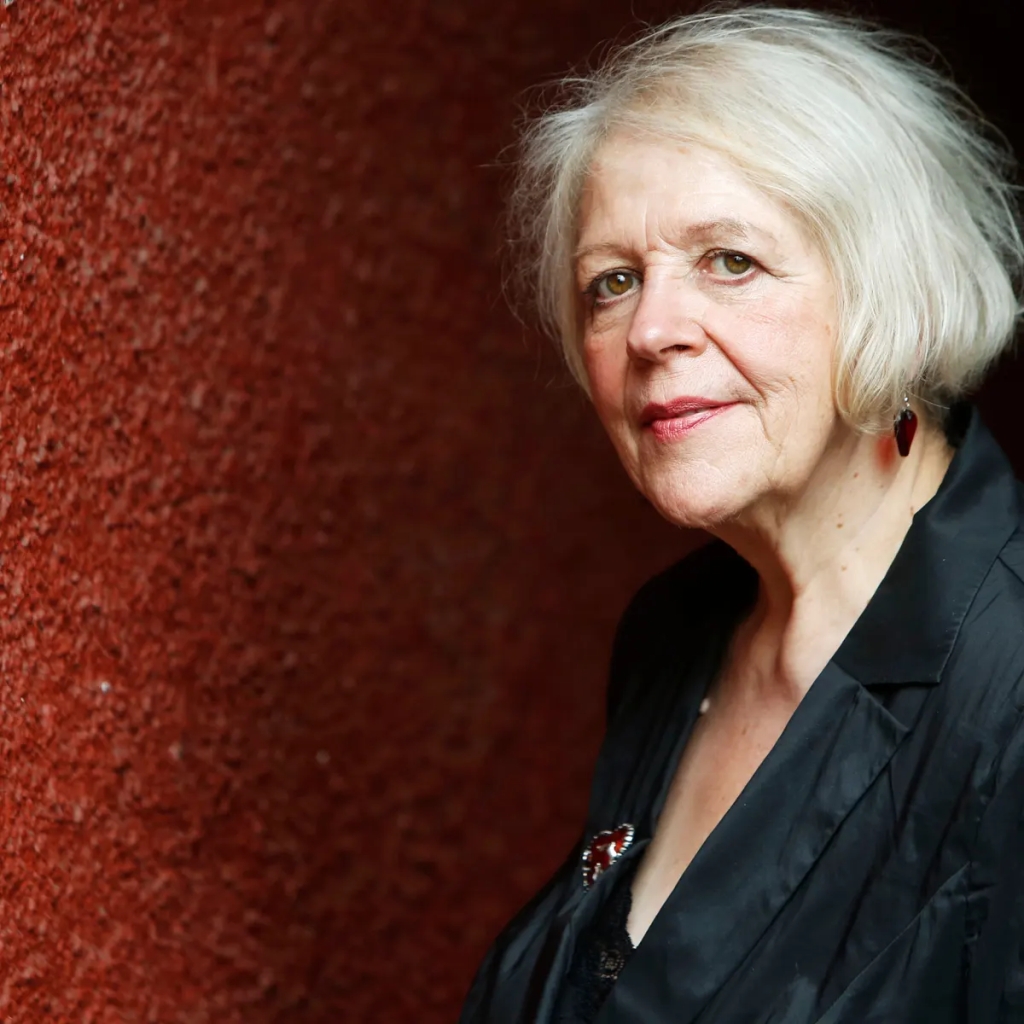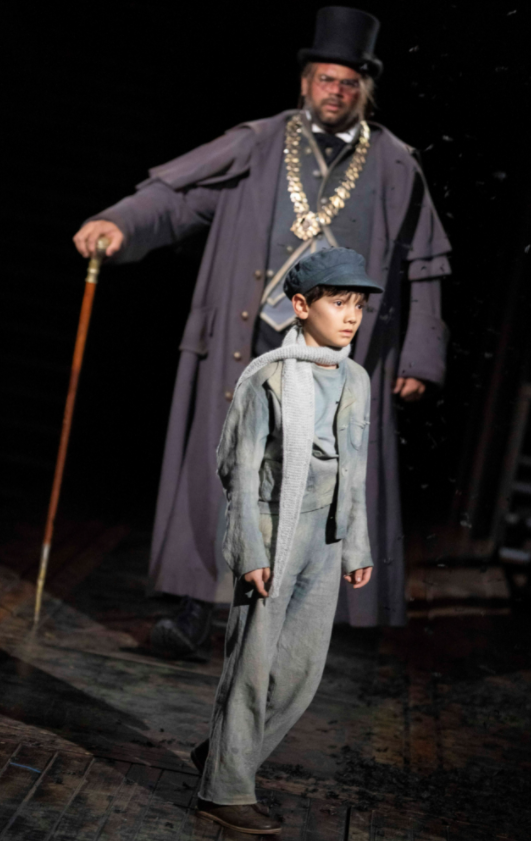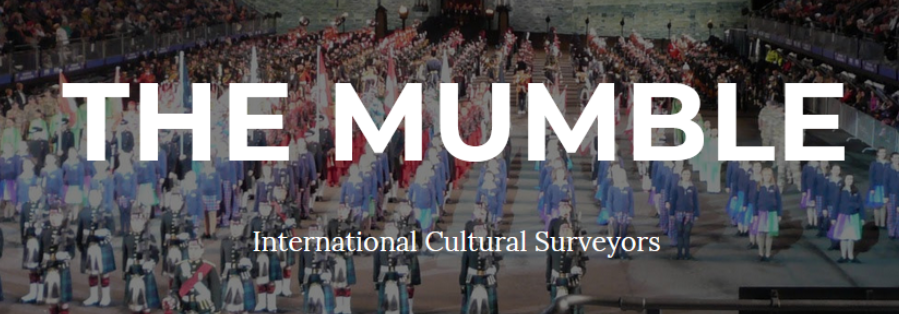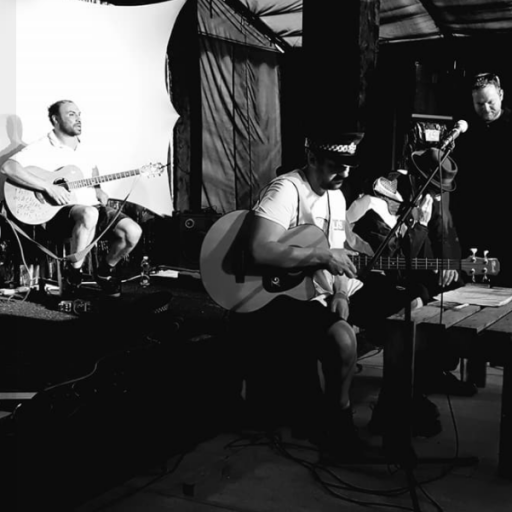Stanza, Poetry Festival

St Andrews
March 9th, 2024
Yesterday on a freezing beginning of spring, I was on my way to a Poetry Festival in Scotland’s St Andrews called simply Stanza. The Byre venue in the ancient University town is a well known theatre there. Stanza has 26 years experience working with some great poetry both local, from all corners, and abroad. Their lengthy and in-depth insight into poetry was communicated in the day (Saturday) I was lucky enough to be there where inspired be readings my own thought went to many places and I was surprised how often I was changed throughout the day at the very differing yet unified, organised Festival.
So with a couple of hour’s journey behind me I arrived in time for a morning Master class. The hour was held by one Daljit Nagra who is a very successful poet as a nigh on Londoner with previous roots in India. As a poet he has taken up writing about the duel cultures he has known and experienced, 2003 was a big year for his cutting edge work.
I sat taking things in as his group of around 20 poets discussed and revealed this intimately shared media. You could almost see the great balls of energy being passed around the large table it was already an invitation to become deeply involved. The day from then on opened up with many daring hearts and strong as roots clarity that brought crafting words to very enlivening questions to champion or to powerfully become lost in. On the table (quite literally) was the interest poetic thought has in softly carving out a sense or deeming of the sublime.
My day there in the small, beautiful and very humble Byre environment was so well taken care of I relaxed heavily to soak up this heightened sense of expression and exploration of many things not least academia. The whole day was indeed a master class of everything that is powerful coming from dedicated people. Referring to each other constantly and performing intact or lucid tales commanded by their commitment to words and the life they bring.
The Loud Poets (my second extravaganza) workshop was an hour that with a gusto of intensity explained what is becoming in the spoken word aspect. They are a group of four but the workshop was presented by Kevin and Katie for whom this performance art was their profession and life, their name was very playful as was their style of teaching. The theme of exploration was by this time becoming well laid for my next encounter, which was to be a lecture from renowned poet and public speaker Jason Allen-Paisant.
This multi award winning poet has such roots in his wider community his revered book ‘Thinking with trees’ demonstrates an over arching ability to find the makings of a great many human endeavours. His stance was based on the free expression for violated human rights and there effects on the individual heart and soul. He used his own poetry and quotes to poignantly point directly to the important field and platform that only poetry can give us. At this time I was beginning to realise the extent to which this poetry was for whichever way you most desired it to be, even as everything was the freshest version it could be.
In this thrilling atmosphere I went upstairs to a room they call Studio to see a stage and set. By this time the works of poetry were being questioned to such a great extent its purity rose in stature also having the power to have or lack for non-understanding, I felt this resounding well as ‘we’ll see’ sprang to mind.
Then as we were darkened on came one Sean Wai Keung whose work and life have come together to do amazing things in writing, performing and cooking. His Glaswegian smile said everything as he married the three into a poet’s performance having had a diverse life with regard to culture, appearing as something of a loving grand master. Using normality to express this sublime thing we were now introduced to. His drive was strong since his work is commendably successful in the realm of teaching what may be poetic.
It began to dawn on me as I in readiness prepared to find myself disrobed and exposed. I was in a state where openness was all that really mattered as the poetics let me grow on the spot. I started to hunt and pinpoint what I could get on well with but all of the material left me with nothing but a commendable amount of praise.
I was first introduced and somewhat educated by the festival back during lockdown. I had not long taken up the form back then so listened intently not only to the writing but to the talks of just how wide it can reach this extended hand. That in interpretation of work from one language to another often offers up the difficulties that little phrases may make of the original work into entirely new meanings, such a subtle nuance.

The international presence emanated as essentially poetic doors were opened. In a continual way the very hearts of poets who stood up to poetically describe scenes of adversity that changed their life and gave their works the highest sense of cutting edge. With this giving force that yelled, spoke softly or otherwise it left nothing to neither ignore nor leave out.
The festival showed its roles in many ways, its practice’s, understanding’s and purposes. Through the enabling of giving or taking a voice the core took on more and more of mysterious slight as level’s of insight looked at style and knowledge using the voice well kempt for performing. Things kept on arriving at little nuances that could fly off elsewhere, set things apart, and then come back to stances and gestures with a pure sense of individual style.
Then came a showcase from a group called ‘Clydebuilt Poets’ another powerful, sensitive Scottish based group who find their poets in the heart of communities and offer a platform to this greatly celebrated and resolved task of poetry from heartfelt relating to grass roots. The 4 poets had very differing interests as the overall Master class of the festival made inclusivity out of gold.
The four were: Alison Cohen, a poet for whom late blooming was turned to her advantage, her expression of life was instinctively concise. CD Boyland, whose brave demeanour and heroic voice reflected on Faust and its significance, great significance even today 200 years on. Julie Laing, whose poems on Scotland reached a mark so well defined and so grippingly informed and last of the four one young, gifted and talented Lucille Mona Ling whose captivating words were well beyond her years.
The building was entranced in conversation as the heraldry of feedback gave a salute to the way poetry grows, it gives you feet and offers a very solitary voice even amid other such lovers. Ever so rich in the company of greatly influential references whose names seemed to ring out and be more than just role play, something else was on, a different thing, a thing that Moroccan poet Mouna Quafik expressed with contingent changing presence.
Having called her performance reading ‘From the Female Chimpanzee to Darwin’ She with great spirit married her performance as an aficionado and as a poet with a stand up skills creating a comedy out of expressive sincerity. I felt her words trickle through me of the very highest reality, she described herself and the world as a scene, autobiographically pertaining her poems with a fire of personal critique and with a totally abandoned personality. She shaped everything into the kind of poetry that gleamed with the light of truth. Honesty and compassion never looked so good.

And as the day had passed in great pleasure it was time for my last enlivening experience as I took my seat to the mid evening performance: a reading from Liz Lochhead herself and the very timely introduction to one Michael Pedersen.
The lectern on the stage took on a kind of metaphorical role of substance as the support for the hero poet. In this world of deep and nourishing encouragement its information alone carried tremendous weight. The young but incredibly talented Michael Pedersen walked on to read from his acclaimed book ‘Boy friend’ released in 2022.
His stance was of someone well versed and very capable to entertain. His works were uncensored and unafraid to go there, anywhere he likes. He took us with revelry through pains of the past and self confessed odd behaviour with a sharp wit and a very graciously crafted sense of humour, evoking grateful laughter from his refreshed and attentive audience, then called Liz for her reading.
Liz Lochhead’s story in poetry is impressive to research. Her dedication to art holds her in the highest esteem. She came on and not a soul stirred, reading from her work she took us into a vision with such a finery we could glance every detail, taking so great a care she led by example, capable of the greatest and smallest things in life. Her presence remitting a wit that has seen her traverse the globe with abounding and unending energy, forming friendships from every aspect of life. Her life a story of revelry and service, her voice an organ as much fit to console as to encompass an entire room.
The organisational expertise in the hands of directors and a staff gave an education by guiding audience and participants to the heart of everything, their world, the life, making poetic charm unlike magic that refuses to reveal it secrets, it was joyful and magnanimous.
Daniel Donnelly
Oliver!
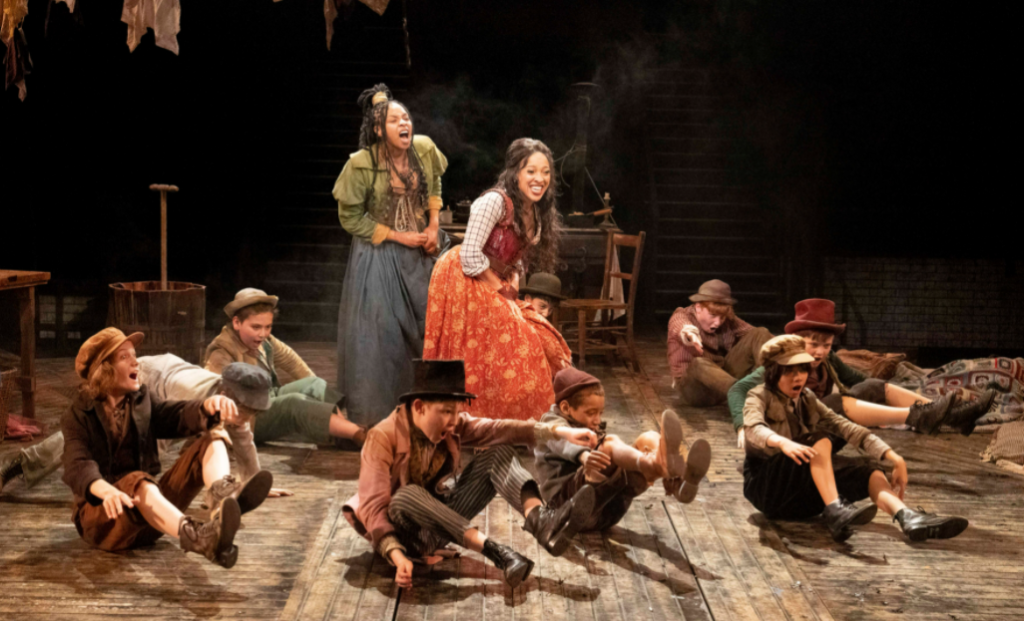
Leeds Playhouse
Nov 24th – Jan 27th, 23/24
I have truly just witness’d the art of Operetta almost brought to the fullness of perfection. What a treat! The place was the Leeds Playhouse; the show, Lionel Bart’s Oliver; the time, the first day of Advent, 2023; the result, a massive standing ovation. But before I penetrate the nuts & bolts which created the magnificent technical & symbiotic machinery of the dramaturgical illusion, I’d like to begin with the two thoughts that prosper’d in my mind as I watch’d & joy’d my way thro’ the show.

Firstly, I’m pretty sure now that Oliver is the second best musical, pluck’d from the aether in 1960 via the pen of Lionel Bart, who has been described by Andrew Lloyd Webber as “the father of the modern British musical”. On account of a couple of weak songs by Bart, Webber himself would go on to create the best British musical in the seamlessly excellent, Jesus Christ Superstar.
Secondly, when Charles Dickens wrote Oliver twist in 1838, the British welfare system was barely in it’s proto-infancy, & it’s amazing to see a character like Fagin, basically providing food & shelter for desperate orphans. Alright, they’ve “got to pick a pocket or too”, but at least they were being cared for, if only thro’ functional dysfunctionality. Shame on you Victorian Britain!
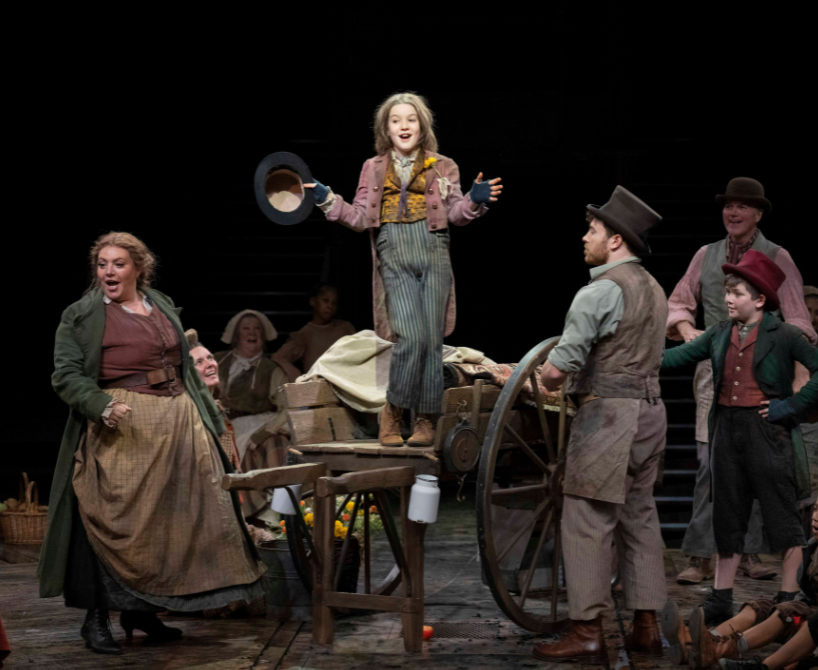
…& so to the show. The ensemble forg’d by Leeds Playhouse for their Oliver is a bit like when Brian Clough created the Nottingham Forest team that won the championship & two European Cups in the late 70s – drawn from everywhere & compacted into a 24 carat diamond of quality. The Sowerberry couple, for example, were Scottish & Brummie.
Oliver himself was a wee cuteball of a lad, bristling with a mature magnetic presence; the Artful Dodgy’s cockney accent was astounding; Bill Sykes was genuinely scary; while Nancy ooz’d pure emotions. The cast was really big, actually, but tight as an ant colony foraging for food. Everyone knew what they were doing, like!

Throughout the performance, the Playhouse utilis’d its round-style, multi-platform’d stage to the fullest – there was stuff going on all over the place, but never confusing, always boiling with voluptuous energy. We’re talking recreating busy Dickensian London, ‘ere, so let’s just call their flawless choreography a wonderful helping of highly organis’d chaos. So much fun to do, & watch!
“These sausages are moldy!”
“Shut up & drink yer gin!”
The songs – Consider Yourself was a masterpiece of happiness -, the costumes, the colours, the music, the just about everything was amazing. Other sweet touches included the piano which accompanied some of the songs being a busted up dusty old thing, while nearby a lady sign’d her way thro’ the whole show for the hard of hearing.
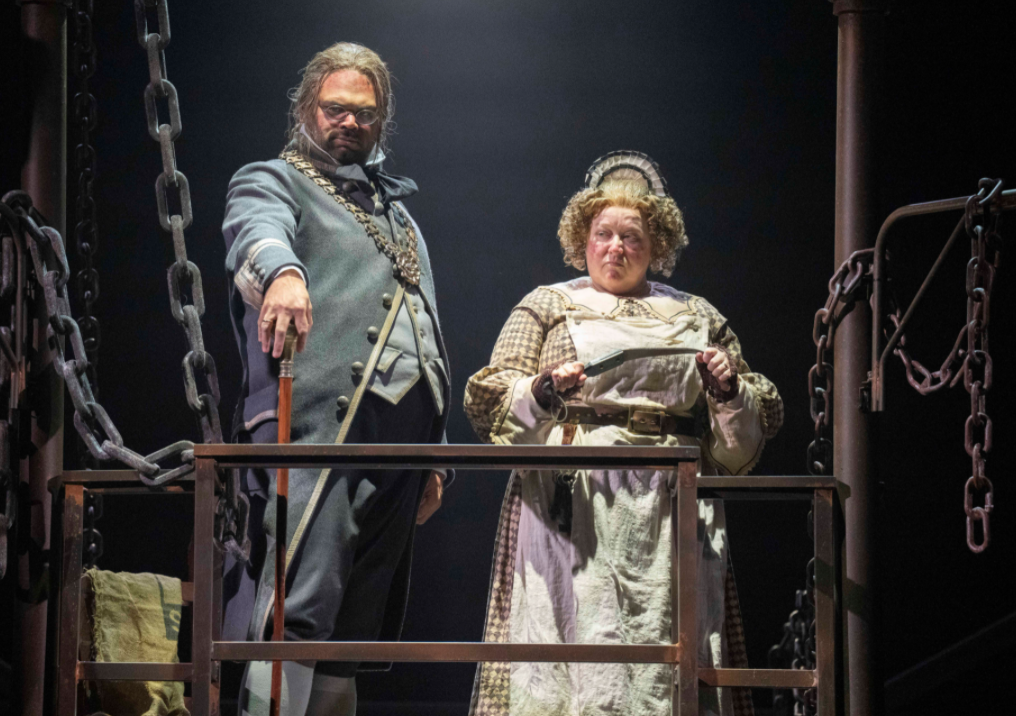
Alas, if you notic’d I mention’d at the start that this Oliver had been ‘almost brought to the fullness of perfection.‘ I use the word ‘almost’ because my favorite song, the one that I actually play at parties when I’m a bit giddy & that, is the 1968 film version of ‘Who Will Buy‘. Unfortunately, the Leeds Playhouse cut it in half, just before it gets funky, & inserted some bloody dialogue. I’m like, perch’d on the edge of my seat just about to leap into spontaneous boogieing & everything, going ‘that’s not what’s suppos’d to happen!’

But that was the only criticism, other than that the Leeds Oliver was a most splendiferous occasion, one of which they should be proud of pulling off – it’s quite an ambitious project -, & an occasion which the whole of Leeds & West Yorkshire should avail itself of – this is not one to miss.
Damian Beeson Bullen
Birthright

Finborough Theatre
London
September, 2023
A courageous and provocative piece, playwright T. C. Murray wrote Birthright in 1910 for the Irish repertory company, Abbey Theatre Dublin. Causing a storm, this was Murray’s debut and it hit the zeitgeist garnering ructions and acclaim across the Irish isles and beyond to the West End and Broadway. The Finborough Theatre proves its much celebrated status with another compelling contribution to fringe theatre.
This new staging, the first in over 90 years in Britain, sees Director Scott Hurran bringing this intense domestic drama to its fullest expression. Set in Cork, we witness a family in crisis at the most intense and acrimonious point in its history. The scenes roll together smoothly with the passions burgeoning to a thundering conclusion. The set, costumes and overall atmospherics create a highly evocative and immersive experience. The lighting starts off bright then gets darker as the family descends into the abyss. The increasing use of candlelight as the play elapses, makes the characters seem like ghosts with their transparencies emerging from the ensuing dramatic exposition.
Patriarch, Bat Morrissey (Pádraig Lynch) commands the stage, infusing the play with ribald energy and undergirding the pathos with his slow-boiling rage. It’s one of the most intimidating and statured performances I’ve seen in recent times and to be so close in that intimate space was breathtaking. The only downside, his tremendous vocal power is unbalanced with the rest of the cast and mismatched to the smaller space – a sense of proportion vocally would make his performance more accessible. Maura Morrisey (Rosie Armstrong), impressively stoic in her role as the long-suffering house wife, is the doting mother of the ill-favoured older son, Hugh Morrissey (Thomas Fitzgerald). The favoured son, Shane Morrissey (Peter Broderick), seeks to provide a balance to his father’s wrath through filial connection yet finds it must ultimately give way to his sense of duty. All actors found their place in the interconnection and with superb Irish accents and deep commitment to the work, this group are weaving a rich tapestry for audiences to enjoy.
I was thoroughly overwhelmed by the play which felt like a time capsule artistically – dropping us to a moment when theatre was done differently. I noticed I was looking for more of a psycho-therapeutic exploration of the characters’ inner worlds, although I recognise that to be a style only established in the second half of the 20th Century when theatre became more mimetic and non-diagetic. With this type of theatre, we have to do the work to hear and delve and render the world of the play given the psychological “nudity” we’re so used to in contemporary theatre is not the modus operandi here.
Much would have been understood by early 20th Century audiences about the cultural contexts of the story but fast-forward over one hundred years and I, a child of the 90s, am used to having more laid out for me in the writing. Nonetheless, it’s a noble cause to revitalise a piece of theatrical history and be sophisticated enough to execute the archaeology of the artform to the extent that a modern audience can find new meaning. The ensemble and production team have achieved this with aplomb and should be commended for this audacious and intelligent rendering. It was an explosive, transportative, fly on the wall snapshot of rural life in early 1900s Ireland. I felt the cold, the adversity and the corresponding warmth of the familial hearth, over-heating as fate scored the family with its inescapable summing.
Stuart Bruce
Book Tickets
Intimacy
theSpace @ Venue45
Edinburgh Fringe, 2023
Hinc Illae Lacrimae
Intimacy – is it about pleasure, compassion, love – all of the above? This new two-hander by Sarah Nelson, staged by Watershed Productions, raises complex questions about where and how people seek intimacy and their different needs for physical pleasure and emotional connection.
Chloe (Caitlin O’Ryan) is interviewing Nel (Imogen Greenwood) for her masters thesis and the questions pertain to her sexual history and values. It’s highly personal but Nel is an empowered character and confident in her sexuality. There is overwhelming judgment from Chloe, it seems, so Nel stridently defends herself and together they unpack their respective interpretations of sexual culture.
This play lays everything out where, despite Nel’s assertiveness, Chloe also divulges highly private experiences and their connection deepens. Both characters agree with the discrimination and unequal power dynamics that women are subjected to on a daily basis but each have distinctly different journeys to arrive at their individual sexual cultures.
This presents a contrast that celebrates difference, but also allows a dramatic tension to develop, where conflict is understandable and relatable, without anyone being correct or incorrect per se. It’s interpretive and honest and, in this process, the audience are challenged to negotiate an ethical map without necessarily being sure where the footholds are.
There were some strong elements to the writing but much that rang as unnatural and expositional to me – although I was wondering whether that might have been the actors being distracted because there was an infant/baby making significant noise throughout the play (which was being filmed too, poor guys). For the first half, the listening wasn’t particularly strong which meant the behaviour was self-generated and a little artificial. It felt like only at the end of the play, was the contact between the actors deep enough to make me believe they were naturally interacting and I wonder whether they would have been strong the whole way through if it wasn’t for the distraction.
I did enjoy how the play crescendoed as the pressure-cooker built. A strong twist and strong emotional catharsis arrive in the second half and the characters must find new levels of compassion to be able to process their situation. The characters end up learning that intimacy isn’t just about knowing your partners but also knowing yourself and finding compassion for others.
Stuart Bruce

Upstart

Gilded Balloon Patter Hoose
Edinburgh Fringe, 2023
Ex Pede Herculem
Despite his most famous reputation, the biography of William Shakespeare is scanty short on details. A signature here, an obscure anecdote there, it is down to a metemimesial study of the plays & poems themselves to tell us more about the man. The rest, by the way, is just made up, or we might use Tudor-Stuart materielle yet extant to flesh out the meager skeleton of Shakespeare that we have. Create a whole dinosaur from a single tooth, kinda vibe.
& so to Upstart, by Mary Jane Schaefer. First things first, what an absolutely adorable set, one’s receptacle mind is instantly plung’d into that in which Shakespeare plied his pen & trade. The costumes & back-drops are beautiful, & when wedded to Tudor songs & a dialogue fully-form’d of Elizabethean & Jacobean phraseology, the suspension of disbelief is exceptional.
The play consists of two elements. The first of these, & how the play begins, is the elder Judith reminiscing on her famous father. Immediately one is struck by the quality & authenticity of the language which Schaefer has put on the lips of Judith. I mean hearing phrases such as ‘‘twill serve’ – I love that sh!t. The second element of this play is an imagin’d account of Judith’s younger self & her interactions with her famous father – including classic Shakespearean motifs, well Commeddia dell’arte really, of cross-dressing disguises
‘His muse was a trollop who’d ran off with lesser men‘
A major figure in this reworking was a lady of color from London who of course would have been the Dark Lady of Shakespeare’s sonnets. There’s a great seen when Anne, Shakespeare’s wife, is reading the sonnets c.1609 v- in fact gossipy Stratford villagers are leaving copies outside her house showing her husband not only loved the handsome youth but also the Dark Lady & her wiry hair. Classic stuff, altho’ of course the real Dark Lady was in fact the Turkish noble woman who frees William Stanley from his blasphemical incarceration in Istanbul. Well, that’s what I think anyway!
Yes, an absolute darling of a piece is this – all the performers are adorable to watch & I would advise anyone with a hint of a love for Shakespeare to see this – he really is brought back to life with eloquence & energy better than any cinematic attempt. The humanity of the great brooding poet is on show for all to see. My only gripe was how politely handl’d, or skiff’d over, was the ‘second best bed’ offering by Shakespeare to his wife in his will. This was a perfect chance to kick a nail out of his coffin & hammeringly ram it into Anne’s heart – it was far too nice an ending, but why not anyway?
Damo

Oggie! Oggie! Oggie!

C Aurora
Aug 27 (18:20)
Exceptio Probat Regulum
The ‘Holy Trinity,’ let’s say, of Christianity, is form’d by the Gospel accounts of Jesus, the teachings of St Paul, & the lives & martyrologies of the later saints. Among the latter group, the Confessions of St Augustine, completed about 400 AD, is one of the key texts for the encouragement of conversion to Christianity, of how to step from the dirging slurge of a sinful life into a virtuous blissdom of bright & shining rightness.
A massive best-seller, let’s say, in previous millennia, by 2023 the Confessions are being sidelined, somewhat, from mainstream culture. I don’t think I would have pick’d it up to read myself, but seeing Stephan Callaghan‘s one man version of the play yesterday has fill’d that gap, broadening my gnosis in the process.
The play begins with me realising why the play is call’d Oggie Oggie! Oggie – of course, it is short for Augustine, & all of a sudden we are whipp’d to Maryhill or summat in Glasgow listening to Augustine‘s mis-spent youth metamorph’d into a dodgy, beer-swilling Weegie. I mean, it is brilliantly play’d, but a strange start because it’s not too long afterwards that all trappings of modern Glasgow are lost & we are spirited into the 4th century times of Saint Augustine & his tale.
As a performer, Sephen is flawless, & energetic, & his powerful, clear voice projects so well – he really is quite commanding of our attention. The production is also top class – great music, great lighting, great vibes. There are also some lovely audience interactions, rare in theater, but which really do work. Oggie! Oggie Oggie! Is ultimately a highly entertaining biopic, in which Augstine is brought back to life by the dramatic skills of Callaghan. A superb treat!
Damo

The Bad Daters

theSpace @ Surgeons Hall
Aug 26 (16:05)
Fabas Indulcet Fames
As a man who spent the first half of his life in the analogue era, & the second in the digital, I remain resolute & steadfast in my decision NOT to find someone via the internet to go out with on a date. Where’s the magic in that – no, my poetical spirit just finds the whole thing icky. Saying that, a lot of people have gone on to find meaningful & lasting relationships via the internet, two of which, altho’ obviously dramatical creations, are Wendy & Liam, a couple of Irish emotional misfits whose journey thro’ the seven spheres of love-falling is play’d out with a reyt sense of humor, like – I laugh’d harder & deeper during the Bad Daters than I I had even the best comedians I have seen thus far at the Fringe.
‘I’m bored out my tits – say something interesting or I’m out of here‘ – Wendy
Of our two characters, the star of the show is Wendy (Sarah Maria Lafferty) & her brooding underlooks, mainly because the man she meets, Liam (Brian Gallagher) plays rather a subdued-of-soul fella, a gentle foil to Wendy’s tempest. She comes across as a coarse-chopping, anxiety-boiling cauldron of entertainment that shouldn’t be in the dating game, but is driven by the primal need for the perpetuation of the species which drives us all into a need for a mate. Let the thawing of the Ice Queen ensue!
Other elements to this play include, of course, Derek Murphy’s incredibly canny writing, he is reyt on the pulse, like, but I also lov’d all the physical nuances the actors brought to the play, such as the one time Wendy look’d happy about spending time with Liam while speaking to her sister (I think) on the phone – a smile that Liam would never see, hidden as it was by her turbulent soul. Yes, The Bad Daters, this flaw’d & fluttering humming of harden’d hearts, is a pure paean to the awkwardness of love-matching, & is a proper bangin‘ treat!
Damo

Circa’s Peep Show (Club Remix)

Underbelly Circus Hub
Aug 25-26 (18:20)
Every Fringe I will always try & visit the Underbelly’s takeover of the meadows, just because they simply do bring us the very best in cutting edge circus. This year it was Peep Show, & what a truly magnificent spectacle it was! An acrobatically astounding series of stunts & stands, all escorted to rhythmic perfection by the deep & booming industrial beats of a DJ.
Sexy, erotic, quirky, quixotic, I really enjoy’d the constantly flowing, constantly evolving aesthetics of the show,it was all a bit like circus cubism, so tangl’d & twisting were the shapes elongating before our eyes. A swizzing, whizzing, fizzing phrenzie of ever-fluid, gasp-inducing & glorious performances of very clever stuff, it was a wonder. Loudly exclaim’d phrases like, ‘that was amazing,’ ‘that is actually insane’ & ‘that is so fucking cool, man,’ were constantly flicking off my tongue!

I’m definitely hetrosexual, like, & I’m not even ‘in denial’ or whatever, but to see the gladiatorial physiques of magnificent men combin’d with the deftest grace of the most delicate dancers was a real treat. I’m not gonna start composing a load of homoerotic sonnets, or anything, but boy are those boys beautiful!
Alongside them, of course, were the women, completing the yin & yang of nature in perfection. In all my times reviewing circussy stuff these ten years, I don’t think I’ve ever seen such a scintillatingly cohesive union of parts – I mean, the tiniest dip in performance levels & the whole thing comes crashing down, perhaps with leg-breaking, career-ending results. It’s like playing Russian roulette with your limbs – & yer neck!
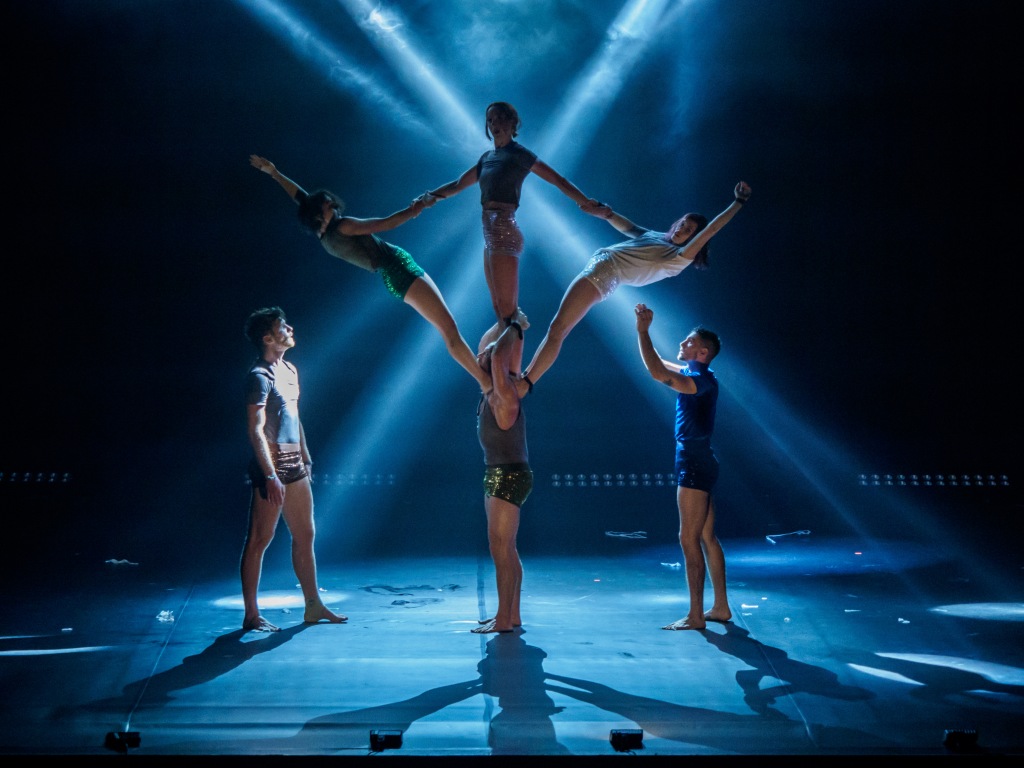
Watching Peep Show does make you realise we Humans are capable of reaching well beyond the capabilities we think we possess. I’m about to treble the size of my epic poem I’ve already spent twenty years on – that’s what I do. But these guys at peep Show are also approaching the upper slopes of Parnassus where the acrobatic avatar of Terpsichore is preparing a reyt funky aftershow party for this young, supercool & phenomenally talented troupe.
Damo

The Rosenberg/Strange Fruit Story

Assembly Rooms, Front Room
Aug 25-27 (15:30)
Qui Desiderat Pacem Preparet Bellum
At its core, The Rosenberg/Strange Fruit Project is a diasporic tour of an America that created & envelop’d the bitter episode that was the trial execution of Julius & Ethel Rosenberg, accus’d of giving atomic secrets to the Russians. Creating for us the frantic & society icing it’s way into the Cold War are two performers; the orator, award-winning actor/playwright John Jiler, & the clarinetist Sweet Lee Odom, who accompanies the words, along with occasional American life-sounds pip’d into the background for extra effect.
The play is essentially a monologue of disparate characters, unified by the desperate tragedy of the youngest son of the Rosenbergs, Robert, orphan’d by paranoid anti-communist McCarthyism & a heavily flaw’d prosecution. After this twist of the knife, came the twist of life which saw the Robert adopted by the man who wrote the song Strange Fruit, seared into public consciousness by Billie Holiday. Among all the scenes, the most moving was when Robert was visiting his mother in prison, with her maternal instinct playing down the best she could the fact that she & his father would soon be fried electrically at Sing-Sing. Poor thing.
The Rosenberg/Strange Fruit Project is heavily Americanised – Shylo, Bull Run, Ike leaving his balls in Normandy, Du Bois, etc.. Multiple references from Stateside history that over ninety nine percent of the Brits cannot relate to. However, at the end of this curious play, the whole room rose & ovated their hearts out with pure off-broadway adulation – perhaps they were mainly American, who knows? Alas, I didn’t quite share the praise-giving, let alone the prize-giving which my role as a reviewer entails.
Saying that, many, many nice touches abounded; subtle costume changes, mysterious jazz sounds cleverly caressing us into the story, & some top notch delivery from Jiler, all fashion a very pleasant spectacle – but I was never gripp’d theatrically. It felt more like non-fiction, rather than a play, however well it was perform’d. I think with such a complex story, more actors are vital – that was my instinct – because, altho Jiler is excellent, it was difficult to suspend one’s disbelief thro the rapidity of character changes. I think, if I wasn’t also trying to assimlate the American cultural references, it might have been easier, but it is a lot to take in otherwise.
Damo

Dexter

Symposim Hall
Aug 22,24,26 (19:15)
Hodie Mihi, Cras Tibi
The dramaturgical work of Nia Williams was my gateway drug to my, in recent years, growing appreciation of Gilbert & Sullivan. I have accepted the inevitable & will now readily admit, I am a fan – & there’s nowt wrong wi’ that. I mean, her plays are not light opera at all, but the influence is definitely there.
Nia’s creation of Dexter is an ambitious project – I’d seen her Verity before, but we now see Verity’s fiance in a fantastically clever spin-off play all of his own. They are to be married, y’see, & while Verity (Jenna Elliot) is fussing & worrying over every tiny detail of the approaching nuptials, Dexter (Chris Jonstone) is fussing & worrying himself sick as to how he’s going to pay for it all now he’s lost his job.
Thro a world by pepper’d by bathbombs & peanut brittle, the play ticks over at an excellent pace, with our leading two being accompanied by an excellent supporting cast. The dialogue is snappy, inherently human & all the songs are great – I love the dissonant two-voice, three–voice, all-voice harmonies which pour from Nia’s mind to dance around the enchanting note-conjuring of her dancing fingers. The music is provided solely by Nia’s keyboard-piano, but the general effect is a sound much more than the sum of it’s spider-dancing index parts.
The story works its way out against the backdrop of the company of fraudsters to which Dexter had gravitated to in his desperate need for money. Along the way we meet other members of this workforce, who have their own sub-plots, while Verity’s supporting role, altho’ lacking the character depth of her own play, is still a pleasant watch & excellent listen.
My favorite moment was at the Hen Party, when from my angle at the far left corner of the room, all the ladies appear’d like Queen in the video Bohemian Rhapsody, rendering yet another of Nia’s superb multi-vocal’d, interweaving cantata. All-in-all, Dexter is a very modern play, perform’d with precision, & is, I think, an improvement on Verity, tho’ it’s been a while since I saw it. Nia is definitely onto something, here & I hope we get a third installment to complete the possible trilogy!
Damo

